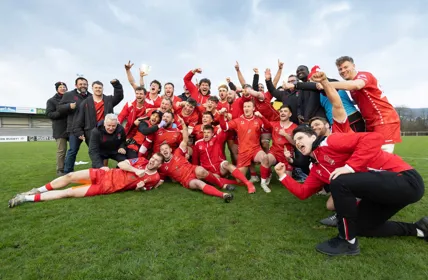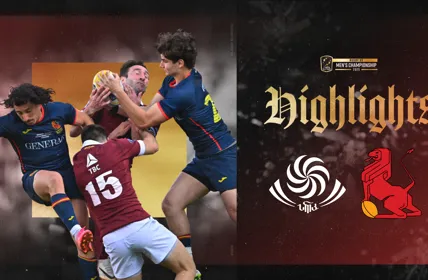Georgia has been a dominant force in the men’s Rugby Europe competitions for the past fourteen years, winning thirteen trophies and producing some of the world's strongest and most resilient players.
In their ranks, Beka Gorgadze shines as one of the best players to have come out of the Georgian youth system, having played in all the Lelos youth grades since he first started playing rugby. But did you know he wasn’t a fit or quick loose forward until he was in his teens?
“Ok, so it went like this. My cousin introduced me as a prop when I was 10 or 12 years old, but sometime later the staff at the academy tried to make a hooker out of me. Because of that, I had to work a lot in the scrum machine, resulting in a back injury. My body wasn’t strong enough to take that pressure, so I had to go through rehabilitation, diet, physical exercise and… I, well, somehow, I grew 10 centimetres in just 3 months. Because of that, I was finally picked as a loose forward.”
Beka Gorgadze’s first sport was football, like most, but his life suddenly changed in the summer of 2004.

“I started playing [rugby] when I was 8, and it was my second sport. Between 4 and 7, I was a football player. Then the Summer break came, and my cousin, who was a rugby player, saw it as an opportunity, grabbed me and brought me to a rugby practice. You know that he would go on to become a U21 Georgian international? He was picked for the 2006 World Cup. He [Salomon Karukhnishvili] was one of my early idols, and it pushed me to follow on his footsteps.”
Rugby became a necessity, a way of life and a powerful love affair that Beka Gorgadze couldn’t leave alone,
“I was immediately enticed by it. The day it became part of my life I instantly fell in love with rugby. It was rugby and only rugby. My mother always pushed me to study and go to college, but for me, it was clear that rugby was going to be my life, even when I faced two early frustrations in my career.”
Before moving on to the next subject, what were those frustrations?
“The first one happened when I didn’t make the 7s team at 14. It wasn’t a surprise. Yes, I was playing at the time as a fly half/centre, but I was a little bit fat. I had good skills, but it wasn’t enough. The second one came one year later when I didn’t make Georgia’s U15 team, which resulted in me working even harder. I ended up being picked to the U17s, and it was then that I decided to pursue the dream of becoming a rugby player.
“There was just the little 'issue' of convincing my mother to let me go to France”, he says. “She wanted me to finish my studies, and I wanted to go abroad. In the end, I finished high school and moved to France in 2014.”
Gorgadze went on to become one of the fiercest loose forwards in European rugby at youth level, and by 2014 he received a proposal to join a French Pro D2 club, beginning his career as a pro player.

“It was a dream come true when Mont-de-Marsan invited me to come to France. It was a new chapter: the environment was different, the language was different, as well as the culture. It was all completely new to me. I was on my own, and I knew what I needed to do. It was a massive challenge, but it is in those moments that you learn a lot about yourself. I had a spectacular time with Stade Montois, playing two amazing seasons with them.”
Widely recognized as a thumping ball carrier and a bone-crushing tackler, Gorgadze underwent a decisive transformation and evolution in 2019,
“Until joining Union Bordeaux Bègles, I favoured my attacking skills more than my defensive game. When Christophe Urios took charge of the team, he made a push for me to hone my tackling, jackling and counter-ruck skills. It was something new for me, as I became an all-around kind of player, capable of helping my team and teammates in more areas than one.”
Having been around since 2014, Gorgadze has bagged more than fifty caps for his country and played in two Men’s Rugby World Cups. But what games did he enjoy the most?
“There were so many. Most of them will always live with me as they played a key role in my life. But if I had to pick one, it would be our game against Russia in 2017. The Dynamo Arena was completely full, as there were fifty thousand supporters in there, and just before the start of the match the fans took their phones out and turned on the flashlight, creating an amazing atmosphere. It was one of my most memorable moments as a Lelos international.”
However, the Cardiff feat of 2022 still sits on the top as the most special game of his life,
“I am getting goosebumps just thinking about it. I remember saying to some of the boys ‘We can actually pull this off. We can actually win against Wales in Cardiff’ with twenty minutes to go. We just needed to keep a cool mind, put them under pressure, chase every kick and defend well. We ultimately did that and won. I have no words to explain the emotions that transpired when the match official signalled for the end. Those moments became part of our body and mind, staying forever with us. No one will ever take that from us. We felt no fatigue or tired, it was all gone… the only thing we felt was the incredible feeling of having accomplished a major feat.”
As stated in the opening paragraph, Georgia has won fourteen of the last thirteen Men’s Rugby Europe Championship editions, but for Beka Gorgadze each one is as special as the next one.
“The first trophy I won as a Georgian senior international was in 2016 when I was just 20 years old. I’ve been part of the team that won the last seven Men’s Rugby Europe Championship titles, and I want to win more.
“There’s that saying that you can get bothered by winning, but it isn’t true, in my honest opinion. It doesn’t matter how many trophies you have won, every time is going to be special, because you are always going to be part of somebody’s story. I always say that we all should be grateful, and maybe sometimes some might forget those ‘little moments’, especially because the REC is becoming more challenging, with Portugal, Spain, Romania, etc. It is always a rollercoaster of emotions.”
But how did Georgia go from a team close to defeating the biggest nations to do it?
“All the work we have done in the past was always meant to help us progress in the direction of being able to beat the top teams of the world. In the first phase, our goal was to play as many games as possible against the strongest sides to gain experience, which then would help us become more ambitious and get us to the point where we could scare them. If you remember, we were close to defeating Wales in 2017 or Italy in 2018, but something was always missing. 2020 was the tipping point. Our time had to come, and, thankfully, it came. Our hard work is paying off, and the new generations are also vital for that improvement. Slowly we are getting where we want to be. I am extremely proud to have been part of it, and I hope that we will clinch more great victories in the future.”
How would the number-eight define his Georgia?
“Resilient. It is the best way to break down who the Lelos are. It is in our DNA. It is in the DNA and history of our nation to be resilient.”
Being now the leader of the pack, Gorgadze is one of the few players who have shared the same pitch with Mamuka Gorgodze. So, was Gorgadze afraid or proud to play by the legend’s side?
“Both! 100% both! The first time we met was in 2015, during the Rugby World Cup preparation. I think you can’t imagine how I felt, as we grew up watching Mamuka Gorgodze. He was the guy. It was a bit scary training with him, as you don’t want to let him down by making a mistake in the middle of practice. He was such a great teammate and athlete, always bringing a different energy to us.”
With the 2027 Men’s Rugby World Cup on the horizon, what goals would he like for Georgia to accomplish?
“We still have to qualify for the Men’s Rugby World Cup, and to accomplish that we have to do well in the Men’s Rugby Europe Championship 2025. Looking back to 2023, there were a lot of expectations for us to deliver something big, but we failed at it. We had an incredible run in 2022 but couldn’t capitalize it when it mattered. There was so much pressure on us. Going to the 2027 Rugby World Cup, we have to keep believing, working even harder, and creating a strong depth in our squad, so we are ready for it. We also have to manage our expectations and pressure. It is one of the biggest lessons that I’ve learned from France 2023.”
To wrap things up, we asked Section Paloise’s captain a couple of questions… first up, his favourite word to say in Georgian.
“Siq’varuli (სიყვარული), which means love.”
And what meals should a rugby tourist try if they find themselves in Tbilisi?
“Khachapuri and Khinkali. Please, don’t make the mistake of travelling to Tbilisi and not ordering those typical Georgian dishes! And please tour Tbilisi. It is a beautiful place, especially in the old part of town. There is so much to discover and find out.”
And what does it mean to play for the Lelos supporters?
“We want to make our fans proud and make them smile and feel happy. That’s our duty, our goal and our mission. They are there for us in the hard moments, and we have to be there for them as well.”
By Francisco Isaac




